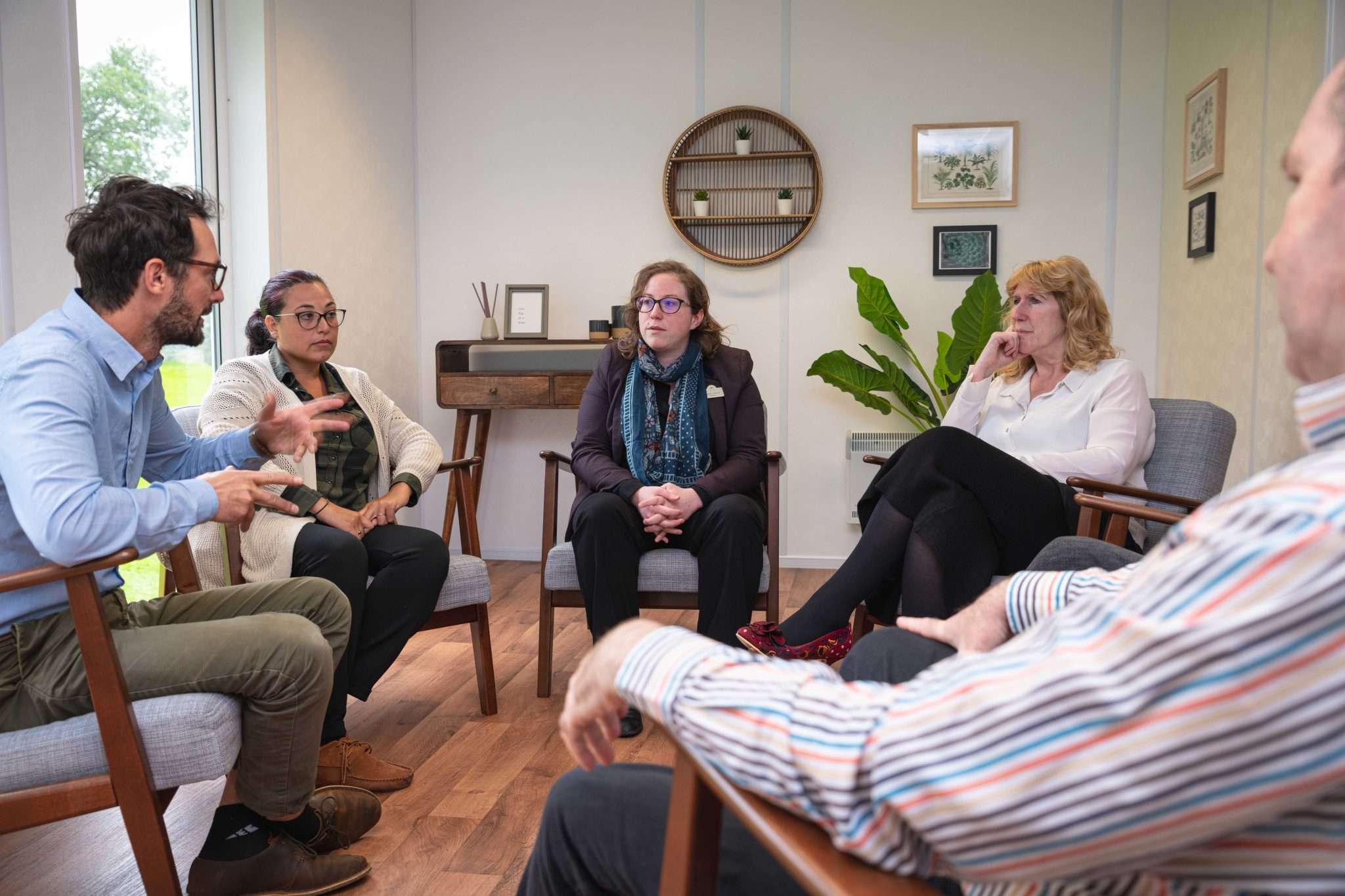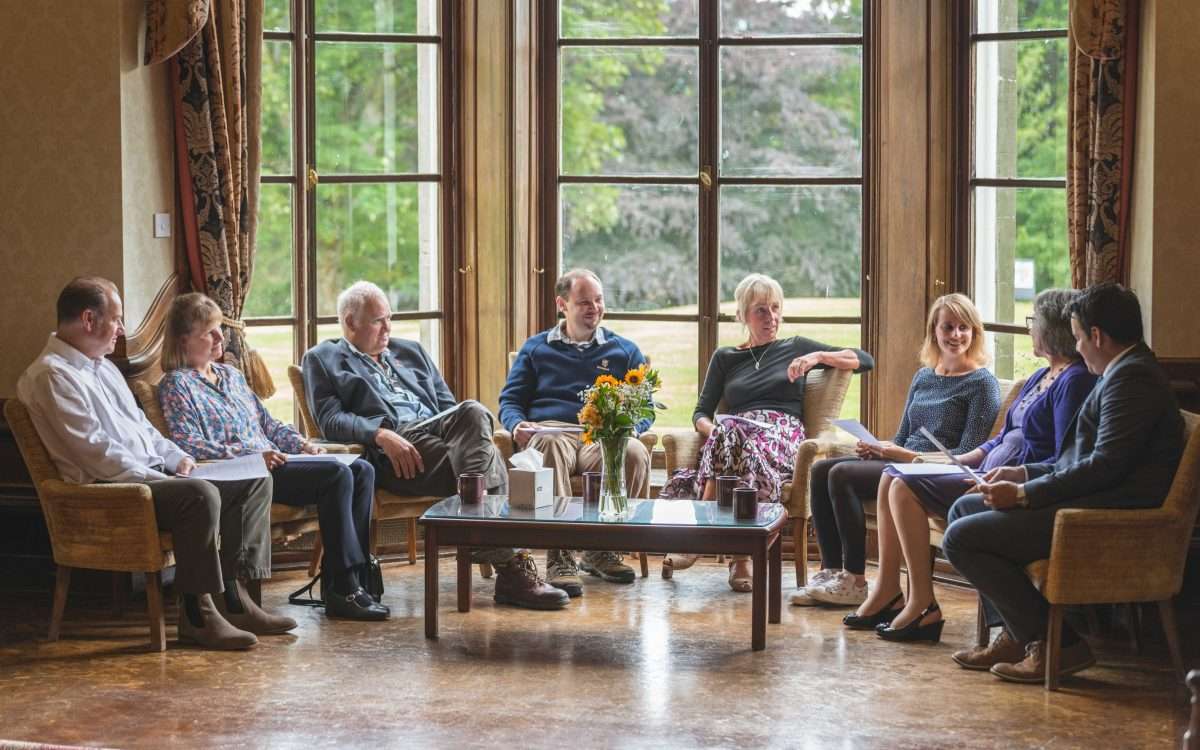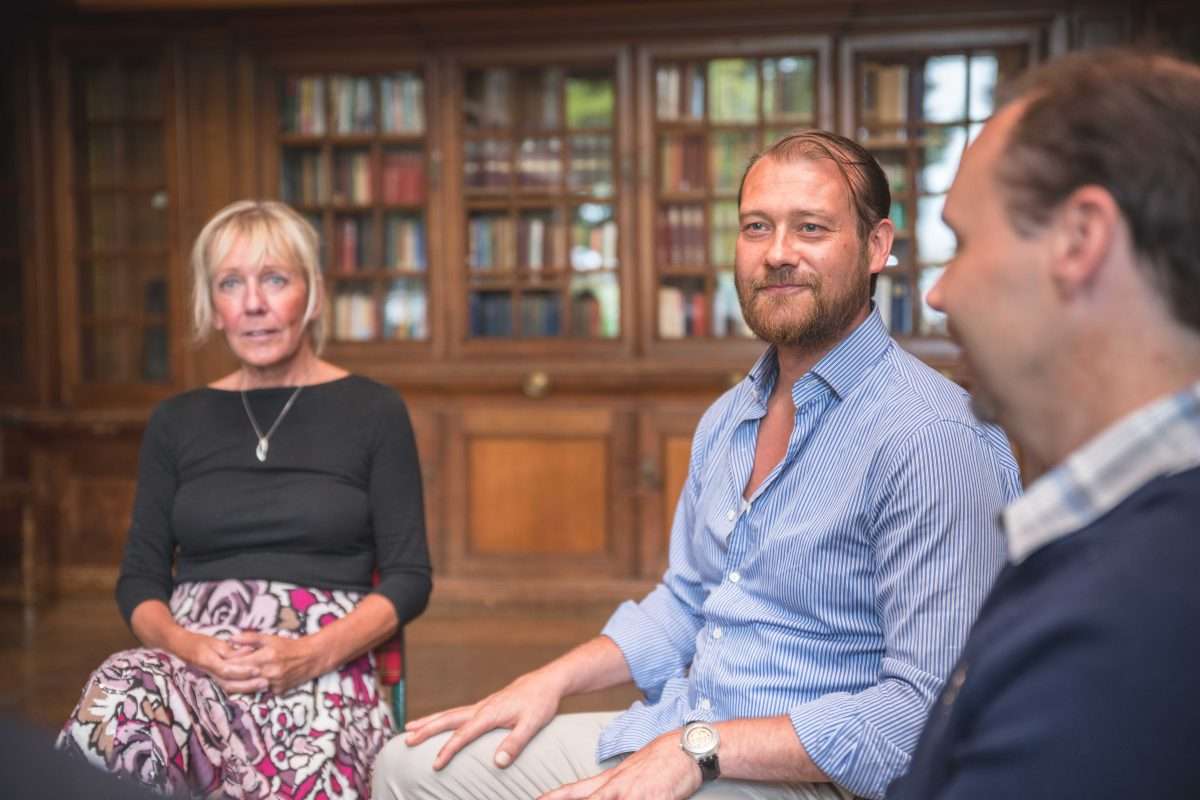Alcoholics Anonymous
Alcoholics Anonymous (AA) is a worldwide fellowship of people who meet in groups to address their problems with alcohol use disorder, also known as alcoholism. In these groups they share their experience, strength and hope with each other that they may solve their common problem and help others to recover from alcoholism. The only requirement for membership is a desire to stop drinking. These groups and represents a supportive, free resource that should be tried and wherever possible embraced by everyone in early recovery from alcoholism.
“There are no dues or fees for A.A. membership; we are self-supporting through our own contributions. A.A. is not allied with any sect, denomination, politics, organization or institution; does not wish to engage in any controversy, neither endorses nor opposes any causes. Our primary purpose is to stay sober and help other alcoholics to achieve sobriety.” – AA, ‘Who Me?’ Leaflet.

Attending Your First AA Meeting
If you have never attended an AA meeting before you are probably nervous, possibly sceptical about what they involve. You might wonder what the people are like in AA meetings, how long AA meetings are and whether you will be made to speak out loud. Learning more about what to expect in an AA meeting can help you feel more at ease before taking the step to join one.
Where Do Meetings Take Place?
Alcoholics Anonymous meetings are held in-person, often in a local space like a church hall or a community centre. They can also be held online or on the telephone. The members of each meeting decide when, where, and how often they will meet.
In-person meetings happen in a variety of places where a room can be rented. Meetings occur in places such as hotels, churches, church halls, treatment centres, community centres.
Online and telephone meetings are also available. Various platforms are used depending on what the group members prefer. Some are video meetings where you see each other’s faces. At other online meetings, everyone’s video is off. A popular online fellowship hub is In The Rooms which hosts over 130 live online meetings, virtual AA meetings & 12 Step meetings every week.
Finding The Right Group
Finding a group where you feel you belong and can talk about your hopes and anxieties, is an important factor in keeping your recovery positive. All groups share the same underlying principles to ensure everyone feels respected, heard and valued. Your introduction to meetings during your stay in residential treatment is designed to make the transition easier.
Spend some time discovering what is right for you. If you feel most comfortable in a single-sex group, a faith-based group, an atheist or agnostic group, or a LGBTQ+ group, then you will be able to find this. As always, the primary purpose is to stay sober. Fellowship members do not lay down rules or judge others.
The more regularly you attend a group, the more connections you will make and the more you will feel you belong.
Common themes between AA groups include:
- Respect: Members are expected to listent to and respect each other’s stories without judgement, which encourages participants to feel safe when speaking openly.
- Confidentiality: All participants can remain as anonymous as they wish and first names only are used. A common expression is: “What is shared in the meeting, stays in the meeting.”
- Mutual support and encouragement: The atmosphere at an AA meeting is supportive, with members sharing encouragement and empathy.
Meeting Types
Meetings are typically listed as “open” or “closed” meetings.
- Open meetings are available to anyone interested in Alcoholics Anonymous’s programme of recovery from alcoholism, including family, friends and interested outsiders. Nonalcoholics can attend open meetings as observers.
- Closed meetings are only for those who have a drinking problem and “have a desire to stop drinking.”

Seek Help Today
What Happens in the Fellowship Meetings
Attending your first meeting of a local 12 Step group may seem daunting, but it is here that you will find a connection to the support, enthusiasm and experience of like-minded recovering addicts. Addiction isolates those it touches, making them anxious, fearful and desperate. In recovery, the most pressing need for most people is usually reconnection with their community.
The format of a meeting may vary from group to group, so we will present in general terms what you can expect.
Introduction
- The meeting usually begins with a warm welcome from the meeting chairperson. To create a sense of familiarity and ease any anxiety, they will often as newcomers to introduce themselves by their first name and are welcomed by the group. Some chairpeople recite the Serenity Prayer at the start.
Reading of preamble and principles
- Many meetings begin with a reading from the Big Book — frequently a portion of Chapter 5 (“How It Works”) or Chapter 3 (“More About Alcoholism”). This is often read aloud at the beginning of each meeting to remind participants of the group’s focus on support, anonymity, and recovery.
Sharing of stories
- The core part of an Alcoholics Anonymous meeting is the sharing session. Anyone who wishes will take turns sharing their personal experiences with addiction and recovery. Sharing is voluntary, and there is no pressure to speak if you don’t feel comfortable. The shares are often emotionally powerful, providing insight and inspiration for all.
Readings and reflections
- Many fellowships incorporate readings from their literature, such as the “Big Book” in Alcoholics Anonymous or other relevant texts. These readings can focus on reflection and discussion, offering wisdom and guidance to those in recovery.
Closing
- To close the meeting, there is usually a closing statement, such as the Serenity prayer, a moment of silence, or a closing reading. Afterwards, members may also have an opportunity to speak one-on-one with each other after the formal meeting ends.
Advantages of 12 Step Fellowships
AA sponsorship and community support can serve as healthy counterpoints to alcohol-based friendships and strained family dynamics.
A 12 Step Fellowship group is based on the very simple premise discovered by the founders many years ago: that talking to another struggling addicted person helps you to stay sober, a day at a time. The primary purpose of any fellowship is to stay sober and addiction-free and help others to achieve sobriety. A new member will be encouraged to find a sponsor as soon as possible to guide them through the 12 Step programme.
It has been said that the requirements for a feeling of contentment are a sense of purpose, a sense of belonging, a sense of caring for another person and a sense that what you are doing is right. All these can be found at a Fellowship meeting.
The strength of these Fellowships lies in the fact that they are made up of ordinary people. You will not find any ‘leaders’, ‘experts’ or ‘professionals’ telling you what to do. All members are equal and thus are easy to relate to. There are few things as powerful as hearing another person, no different from you, describe how they are responding successfully to the same challenges that you yourself are facing. When you see their happiness and peace of mind, you want it too.
AA Does Not Have a Hidden Agenda:
- Apart from a £1 for the pot to pay for rent it does not ask for money. Even this is optional.
- AA asks you to choose a Higher Power that may be a God of your understanding or anything that provides powerful help (such as the AA Group itself), as long as it is not you.
- All AA groups are autonomous except where other aspects of AA are affected.
- AA is non-political and has no comment on outside issues.
- AA is open to everyone, regardless of race, colour or creed, who has a desire to stop drinking.

AA’s Member Surveys
In the past 15 years, two surveys have been conducted (2007 and 2011) voluntarily by men and women currently attending AA meetings.
- The more committed and “working”, the better the result
- 72% of the group had been sober for more than a year
- A third had been sober for more than 10 years.
Alcoholics Anonymous During Residential Rehab
Here at Castle Craig, we know how important peer-to-peer support can be throughout the recovery process and actively guide the introduction to AA and NA groups during our treatment programme and also arrange a sponsor and attendance at local groups for when our patients return home.
In addition to the benefits of 12 Step fellowships, we will recommend the intervention of medical professionals to guide you safely through the psychological and physical aspects of the disease. We are always ready to discuss our personalised treatment programme to help you get the treatment you need.
Frequently Asked Questions
Is there an AA group for family members?
Alcoholism is known as a ‘family disease’ because it not only affects the addicted individual but also their family, partners and friends. Remarkably, the 12 Step pioneers found quite early on that their programme could be successfully adapted to help suffering family members. The result was the emergence of family support groups run on 12 Step principles such as Al-Anon (for families of Alcoholics) and Families Anonymous (for families affected by drug addiction).
What is the AA equivalent for drugs?
Just about every type of addiction is served by a 12 Step fellowship specifically adapted to a person’s needs. They are a remarkable resource, freely available worldwide to anyone who has the desire to end their addiction.
-
Different Fellowship Meetings Available in the UK
The best-known fellowships include:
-
- Alcoholics Anonymous (AA) – AA is the original 12 Step fellowship for those struggling with alcoholism.
-
- Narcotics Anonymous (NA) – people experiencing addiction to drugs of any kind are welcome to attend NA.
-
- Gamblers Anonymous (GA) – Gamblers Anonymous is said to have been conceived by two NA members who realised that they could address their common gambling addiction using similar techniques.
-
- Sex and Love Addicts Anonymous (SLAA) – this 12-step fellowship offers support to men and women struggling with addictive sexual and emotional issues, including pornography.
-
- Cocaine Anonymous – for those struggling with cocaine addiction.
-
- Overeaters Anonymous – for those who struggle with managing their food consumption levels.
-
- Debtors Anonymous – for those who want to control their spending.
-
Experts You Can Trust
With a wealth of knowledge and services to help you regain control of your life, request a call-back from one of our professionals today. The choice you make today could change your life forever.

